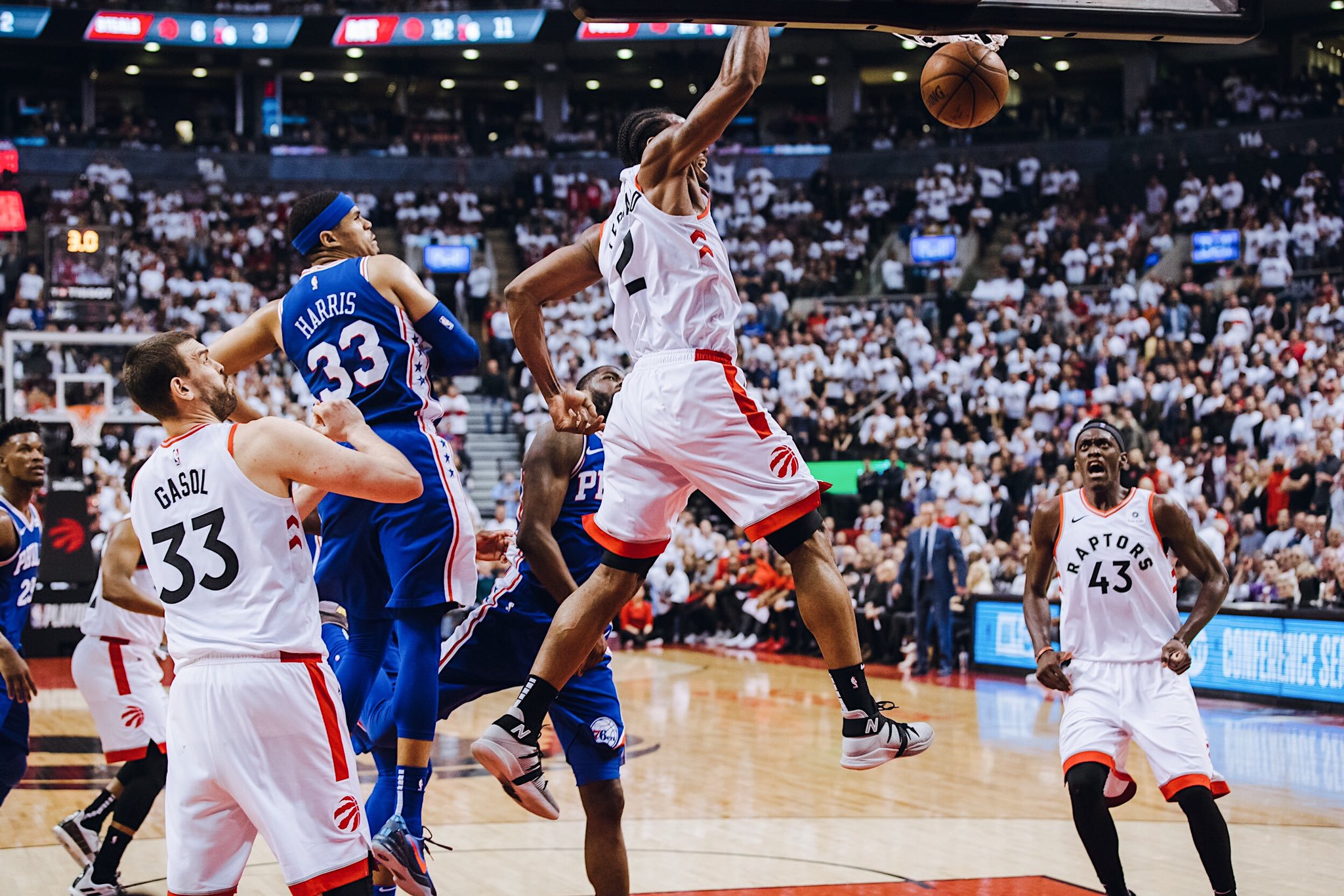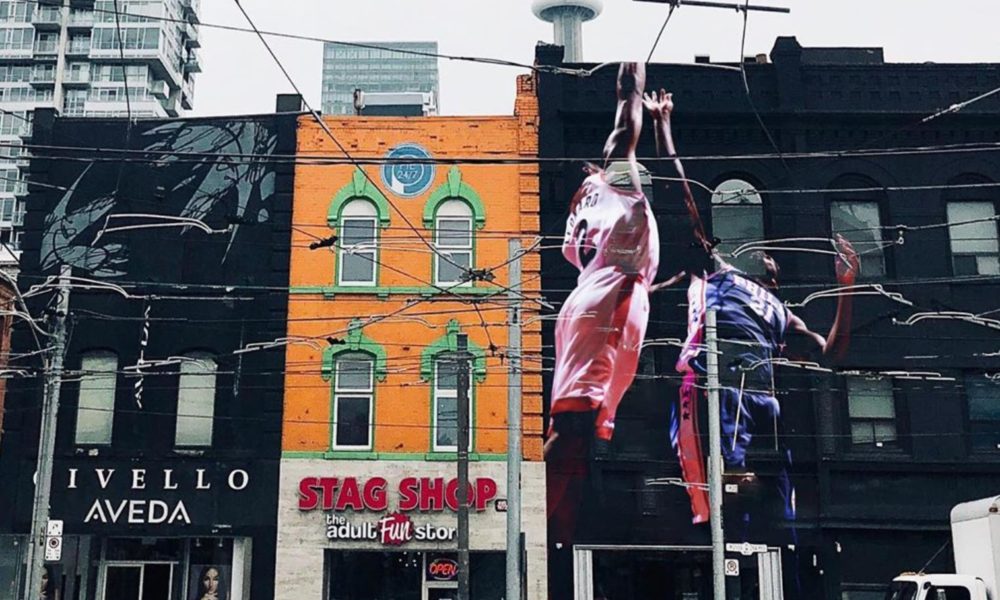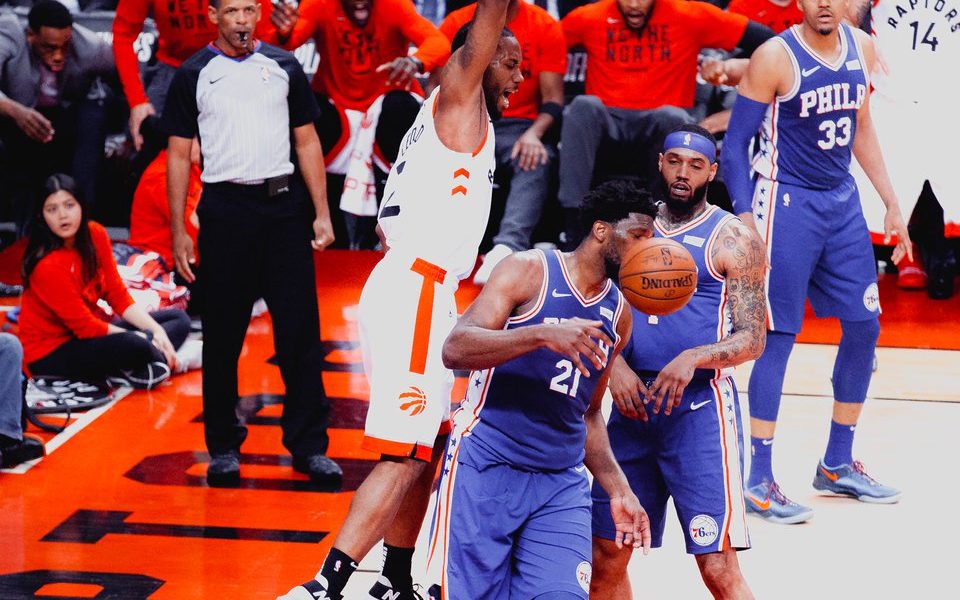The figure screaming in the center of Edvard Munch’s The Scream is the most visible aspect of the renowned painting. It looks inhuman, with its body twisting around the circular gash from which the scream emits. It’s dominant and exciting and easy to notice. But it’s not the most important part of the painting. The whole painting swirls around the screaming figure, bent and bright and anxious. The figure is transitory, but the backdrop is eternal. The remainder of the painting, the bridge, shore, and lake, is the true source of the scream. And it’s not going anywhere. It’s the root cause of the anxiety that makes The Scream so perpetually significant.
On a night that most of the press about the Toronto Raptor’s dominant 125-89 win will be about their excellent shooting, it’s easy to miss the root cause of Toronto’s success. The shooting is bright and noticeable, but the defense is forever. Toronto’s strength as a team has always been their defense. It is their heart and soul, their sword and shield. The Raptors may have some elite scorers on the team, but every player in the rotation is likely a better defensive player than offensive one. That is not to discredit Toronto’s offense, which has been great, but their defense is the foundation of the house. If this team makes real playoff noise, it will be because the Raptors can speak through a bullhorn when they strap in and defend in the halfcourt.
The Philadelphia 76ers are a team with offensive weaknesses. Ben Simmons, talented though he is, is potentially the worst shooter in the league. Joel Embiid is suffering from an upper respiratory illness, his third separate injury problem in just this round. A good defensive team will clamp onto those weaknesses like a monster mosquito, squeezing and sucking until there’s no juice left. The Raptors have defended the 76ers well, but they hadn’t yet pounded them into the earth. There hasn’t been scorched earth-level defense. Not until game five.
Offense can be driven by a singular force. We’d been watching Kawhi Leonard go it alone for three straight games. Defense needs the whole band; if one instrument’s rhythm is off, the whole thing slips into a discordant mess. And for one night, the Raptors were grooving like the dang Wailers.
The game opened with Leonard twice stealing the ball from hapless Sixers, like a teacher off-handedly disciplining a student for passing notes. The simple act of possessing the basketball near Leonard is dangerous. It was ominous foreshadowing, like the placement of an ‘X’ in Howard Hawks’ 1932 Scarface (and, as an homage, Martin Scorsese’s 2006 The Departed) to presage murder. And murder was exactly what Leonard and Toronto did to Philadelphia’s offense. The Sixers finished with 19 turnovers, and by the end of the meaningful portion of the game – the third quarter – Simmons was simply throwing the ball to defenders as if to say, ‘I don’t want to be here.’
Every one of Toronto’s starters finished with at least one steal, and the five combined for 10 altogether. They were able to create so many deflections because Toronto altered the defense to finally counteract Philadelphia’s strengths.
Toronto threw various double-teams at Embiid, far earlier during his post-ups than they had in earlier games. They came from varying angles, and Embiid responded poorly. He multiple times wilted against Gasol and extra pressure.
While Toronto still blitzed some individual players in pick-and-rolls and hand-offs, like JJ Redick, they began to drop Gasol further into the paint on the majority of actions that involved ball screens. The gamble was that Sixer non-shooters would be free to fire away without hurting the Raptors, much like how Philadelphia bet that Lowry and Gasol wouldn’t beat them from deep. As a result, Embiid led the Sixers in 3-point attempts, shooting 2-of-6, while the team on the whole finished 6-for-23. The team displayed great discipline in refusing to bite on Embiid’s pump-fakes.
Another result of Toronto’s defensive conservatism was that it invited the midrange shot. Toronto has been offering the midrange shot to Philadelphia all series, but it was presented with almost laughable abandon in this one. For the first time in the series, Philly obliged. They attempted 37 shots from midrange, far more than in any other game in the series. Though Tobias Harris and Mike Scott made a few, it generally produced incredibly difficult looks that Toronto inhaled off the glass.
And so Philadelphia forced the issue, tried to look for passes when they weren’t there, and altogether made the wrong offensive choices. That’s death against defenses as athletic as Toronto. Embiid and Simmons combined for 13 turnovers, and Toronto scored 33 fast break points, by far the most either team has scored in any game this series.
The defense was a team effort, but there were certainly moments of individual brilliance. Fred VanVleet was excellent. On one possession, he defended Harris in the post before switching onto Jimmy Butler and forcing him into a tough miss at the rim. Later, he stood up Butler in the post and then stripped Embiid after the hand-off.
“Even though he wasn’t scoring, he makes those kinds of plays,” said Nick Nurse after the game. “I don’t want to go into a game like this without a guy like Fred.”
Pascal Siakam was not to be outdone. Midway through the third quarter, with the Raptors dominating the Sixers, and fans in the crowd beginning to mimic Embiid’s airplane celebration in mockery, Siakam bottled up Butler on the perimeter. He switched onto Butler after a screen and moved his feet with the smaller player, staying down on every fake, and contesting the impossible fadeaway when it came. That’s how injured players still contribute on the defensive end.
Greatly as a result of Toronto’s team defense, they walloped the Sixers by the largest margin of victory in the playoffs in franchise history. The Raptors now lead the series 3-2 and will have a chance to finish it on Thursday.
I may be burying the lede, but Leonard had two of Toronto’s great playoff dunks in one game. They were searing, and soul-snatching, and loud statements from a quiet public speaker. Leonard’s dunks were far and away the most brilliant singular events of the game, but they weren’t the drivers of Toronto’s success. Dunks are singular moments, flashing then gone, like a figure screaming in the countryside. The defense was omnipresent, as permanent as the sky itself. If not the dunks, then Toronto’s 16 made 3s may be what you notice at first glance. But neither drove the victory. Instead they were symptoms, not causes, of Toronto’s success. Like distance shooting in the game of basketball, a scream may fade. The Scream will not. And when the Raptors play their brand of stifling, snarling defense, they’re really screaming that they aren’t going to fade anytime soon.



